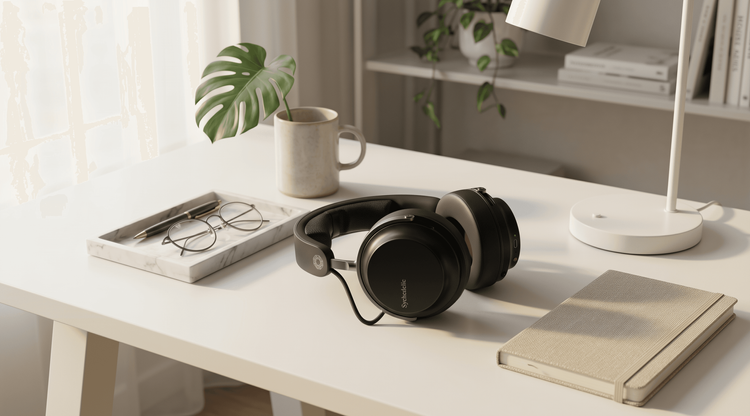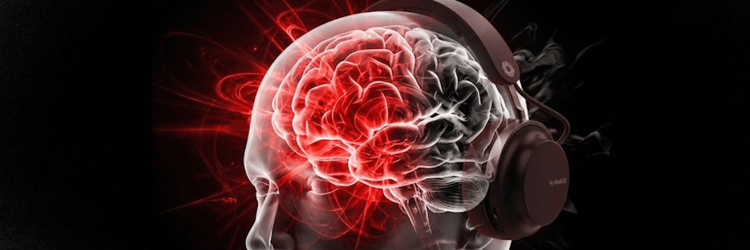In today’s fast paced and high-pressure world, anxiety, stress, and nervousness have become common companions in our daily lives. Whether you're an entrepreneur juggling multiple priorities, a professional dealing with deadlines, or someone constantly balancing personal and work commitments, managing mental health is no longer optional; it’s essential. Fortunately, emerging technologies have made it easier to take control of your emotional well-being. One such breakthrough is the use of smart headphones, including noise cancelling headphones, TDCS headphones, and devices equipped with heart rate monitors and PPG sensors that help you monitor and reduce stress levels.
This article explores how headphones can support stress management, offer relaxation techniques, improve mood tracking, and enhance long-term well-being. We’ll also dive into how audio therapies and mindful practices integrated with technology can significantly ease anxiety and depression symptoms.
Understanding Anxiety, Stress, and Their Impact on Mindset
Anxiety and stress are normal reactions to challenging situations, but when persistent, they can affect your overall mental health. Studies show that chronic stress is linked to depression, anxiety disorders, insomnia, irritability, and difficulty concentrating. In such states, even simple tasks can feel overwhelming.
For entrepreneurs, professionals, and individuals driven by hustle, stress is often a constant presence. The pressure to perform, meet expectations, and manage uncertainty can lead to physical and emotional exhaustion. This stress and strain not only affect productivity but also disrupt sleep patterns and mood stability.
Symptoms like irritability, racing thoughts, fatigue, and difficulty focusing are signs that stress is taking a toll. Mood tracking becomes a crucial tool in identifying how your body and mind react to different stressors. When unchecked, anxiety and depression can make it difficult to maintain relationships, work effectively, and even lead to reliance on medication.
Awareness of these signs is vital. It’s equally important to incorporate tools that help you manage these feelings. Innovative technologies, like headphones designed for relaxation techniques and stress relief (anxiety relief), offer real-time support that strengthens resilience and promotes a calm mind.
How Smart Headphones Help in Stress Management
Modern headphones are not just for entertainment; they are powerful tools in managing stress and enhancing mental health. Devices equipped with heart rate monitors, PPG sensors, and mood tracking algorithms provide users with personalized insights, helping them identify moments when anxiety starts creeping in.
Noise cancelling headphones, for example, block out external disturbances that often trigger anxiety, such as traffic noise, office chatter, or background hums. This creates a quiet space for mindful breathing, meditation, or relaxation exercises.
Other smart headphones offer features like guided breathing exercises, ambient soundscapes, or therapeutic frequencies that promote calmness. These features are particularly helpful when you feel anxious or overwhelmed. By directing your attention away from negative thoughts, they provide instant relief and reduce the urge to react impulsively.
For entrepreneurs and professionals, these headphones are indispensable tools for maintaining mental clarity during intense work hours or high-stakes meetings. Over time, regular use improves stress management, offering better sleep, mood balance, and an overall sense of control.
Relaxation Techniques and Practices Enhanced by Headphones
Traditional relaxation techniques like deep breathing, yoga, and mindfulness exercises are proven to reduce stress and promote better emotional health. However, practicing these techniques can be difficult in noisy environments or when anxiety takes hold. This is where headphones designed to aid relaxation come into play.
Key ways headphones enhance relaxation techniques:
- Guided Meditation and Mindfulness: Many smart headphones sync with meditation apps that offer breathing guides and mindfulness sessions tailored to managing stress and strain. Listening through headphones helps users stay focused and minimize distractions.
- Binaural Beats and Sound Therapy: Certain sound frequencies, such as alpha and theta waves, help slow brain activity and induce relaxation. Headphones ensure that users receive the full benefit of these sounds without interference from external noises.
- Breathing Rhythm Support: Some headphones offer rhythmic audio cues that guide your breath, helping to lower heart rate and calm the nervous system, reducing nervousness and promoting a calm mind.
- Sleep Soundscapes: Calming sounds like white noise, rain, or ocean waves assist with sleep hygiene, a vital component in reducing symptoms of anxiety disorder and depression.
With the right tools, users can build effective habits that support relaxation anywhere, whether in the office, at home, or while travelling.
Mood Tracking and Managing Mindset with Technology
One of the most significant ways smart headphones contribute to mental health is through mood tracking and real-time feedback. Using sensors like PPG, heart rate monitors, and activity logs, these devices offer insights into how your body responds to stress triggers.
For example, a sudden increase in heart rate might prompt a notification suggesting a breathing exercise, while continuous tracking helps users recognize patterns over time. Knowing when and how anxiety strikes enables users to plan and implement relaxation techniques at critical moments.
Entrepreneurs and professionals can also benefit from these tools by setting goals to improve well-being and anxiety relief. Over time, tracking patterns in mood helps users pinpoint stressors, refine their schedules, and build coping strategies that prevent burnout.
Moreover, combining mood tracking with mindfulness practices encourages self awareness and intentional living. Users become more connected to their emotions, learning how to navigate stressful situations with greater ease and resilience.
Stress Relief and Anxiety Reduction through Audio Therapies
Audio therapies are among the most effective ways to address anxiety, stress, and nervousness. With headphones, users can experience these therapies in immersive ways, ensuring greater effectiveness.
Popular audio therapies include:
- White Noise and Nature Sounds: Sounds like rain, ocean waves, or birdsong help mask anxiety-inducing noises and create a soothing environment.
- Theta and Alpha Wave Stimulation: These frequencies calm the mind and regulate emotions by promoting brainwave patterns associated with relaxation.
- Breathing Guides: Structured breathing exercises synchronize the nervous system, easing panic symptoms and promoting calmness.
- Sleep Assistance Tracks: Designed to support restorative sleep, these tracks improve mental resilience and reduce the long-term effects of depression and anxiety disorders.
Using headphones, users can access these therapies anytime, without disrupting their schedules or relying on external interventions. This flexibility empowers them to maintain mental health proactively.
Integrating Headphones into Daily Routines for Well-Being
Building sustainable habits is the key to long-term stress management. Headphones can be easily integrated into everyday life without significant lifestyle changes, making them accessible to busy professionals and entrepreneurs alike.
Here are some ways to incorporate them:
- Morning mindfulness sessions can help to start the day with intention.
- Noise cancelling headphones during focused work to enhance concentration and reduce distractions.
- Mindful exercise routines with breathing guides to lower heart rate and improve endurance.
Midday check-ins using mood-tracking features to assess stress levels and implement coping strategies.
Regular use promotes a healthy relationship with stress, encouraging users to stay grounded, calm, and productive. It helps with stress and anxiety relief.
How Smart Headphones Support Long-Term Mental Health
Beyond immediate relief, headphones play a critical role in improving long-term mental health basically by helping users develop resilience and adopt healthier coping mechanisms.
Long-term benefits include:
- Better emotional regulation through regular practice of mindfulness and breathing exercises.
- Enhanced sleep patterns by reducing insomnia linked to anxiety and depression.
- Increased self-awareness via mood tracking helps users identify and address stressors early.
- Improved focus, and overall well-being, contributing to a balanced lifestyle.
For individuals dealing with chronic stress and strain, smart headphones are a practical and empowering tool that blends technology with traditional wellness methods, making self-care both achievable and practical.
FAQs
1. How do headphones help with anxiety?
Headphones assist by reducing distractions, promoting relaxation through calming soundscapes, and supporting breathing exercises that regulate emotions.
Suggested Blog: How Emotional Health Impacts Productivity
2. Can headphones replace medication for stress relief?
While they are not a replacement for prescribed medication, headphones complement treatment by improving well-being and providing calming tools to manage anxiety.
3. What symptoms of anxiety can headphones help with?
They help with symptoms such as nervousness, restlessness, sleep disturbances, mood swings, and heightened stress responses.
4. How does mood tracking benefit mental health?
Mood tracking offers real-time feedback, helping users understand their emotional patterns and implement coping strategies before stress escalates.
5. Are noise cancelling headphones effective for stress management?
Yes. Noise cancelling headphones block environmental noise, allowing users to create calm spaces conducive to mindfulness and relaxation exercises.
6. How often should I use headphones for stress relief?
Daily use, even in short intervals, helps build habits that enhance focus, reduce anxiety, and promote long-term mental health improvements.
More in Recovery













